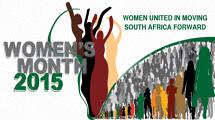By Deputy Minister Stella Ndabeni-Abrahams
[[{"type":"media","view_mode":"media_large","fid":"410768","attributes":{"class":"media-image","id":"1","style":"margin: 3px; float: left;;;;","typeof":"foaf:Image"}}]]In August we celebrate the numerous actions by courageous women on our road to democracy. Women’s Month is also an opportunity to reflect on the strides we have made since democracy.
Most people associate Women’s Month with August 9, 1956 - when thousands of women marched to the Union Buildings in defiance of unjust pass laws. However, we dare not forget how 700 women marched with Charlotte Maxeke in Bloemfontein in June 1913 in defiance of the pass system. Nor should we forget the contributions of countless other heroines whose selfless acts paved the way for our democracy.
It is often said that change is the only constant. Throughout our history there have been seismic moments which have ushered in significant change. However, there are also times when change is frustratingly slow.
One such case is the empowerment of women since 1994. While we can rightly claim many victories and can point to our Constitution, which protects the rights of all, and the raft of legislation that government has implemented, there is still room for much improvement.
Some might argue that empowering women is nothing but a feel-good exercise. However, history has taught us that economies grow and flourish when women are involved. When more women work, economies grow.
In her budget vote earlier this year, the Minister of Women, Susan Shabangu stated: “Empowering women to participate fully in economic life across all sectors is essential to building stronger economies that create jobs and accessible opportunities to women. We all agree that an improved economy can improve the lives of women and children and thereby build stronger families, communities and society.”
Getting ever more people actively involved in our economy is essential. Globally, economies are stuck in a low-growth scenario that is causing untold hardship. Our own economy is still growing, albeit at a very slow pace. Getting more people and especially more women, involved in the economy will help to change this.
The actions we take now will determine our fortunes in years to come. The National Development Plan aspires to eliminate poverty and reduce inequality by 2030. It calls for a unity of purpose to grow an inclusive economy. It emphasises that we must continue to build capabilities and ensure that government and other leaders work together to solve complex problems.
For its part, government has already begun to put the building blocks in place for this future. An important part of this approach is to lay the groundwork for empowering women so that they can take their rightful place in society.
In 2000, South Africa established the National Policy Framework for Women's Empowerment and Gender Equality.
Chapter 5 of the revised 2013 Women's Empowerment and Equality Bill aims to strengthen the enforcement of compliance by both government and the private sector in matters of gender mainstreaming and equality.
In May 2009, the President pronounced on the establishment of a Ministry of Women, Children and People with Disabilities. In May 2014, the President announced a dedicated Ministry for Women in the Presidency tasked with elevating women’s issues.
These, and other laws, have set us on a path to a sustainable future where women are active in all spheres of society. However, progress has been slow in certain sectors and the goal of 50 percent parity is still a long way off.
In many respects, government has set the pace and has done well in empowering women in economic, governance and political spheres. Conversely, the private sector is way off the pace.
The recently published Businesswomen’s Association of SA’s annual census of corporate leadership makes for sobering reading.
“The average percentage of women directors for the largest 25 organisations based on market capitalisation is 24.7percent. Large organisations are slow to transform in gender parity.” the authors say. The overall picture of the census is one of slow progress at the pinnacle of influence and power.
“The findings are disappointing. The conversation has continued for decades and yet very little has changed. Women are still a minority at the top echelons of organisations. Even though there have been marginal improvements, South Africa businesses are well below the 50 percent target’’
It may be tempting to dismiss this as nothing more than figures, or to argue that developing women leaders takes time. But the reality is that we do not have time. The clock is ticking and if we are to reduce inequality, poverty and unemployment by 2030 we must act now.
Stella Ndabeni-Abrahams is Deputy Minister of Communications.





